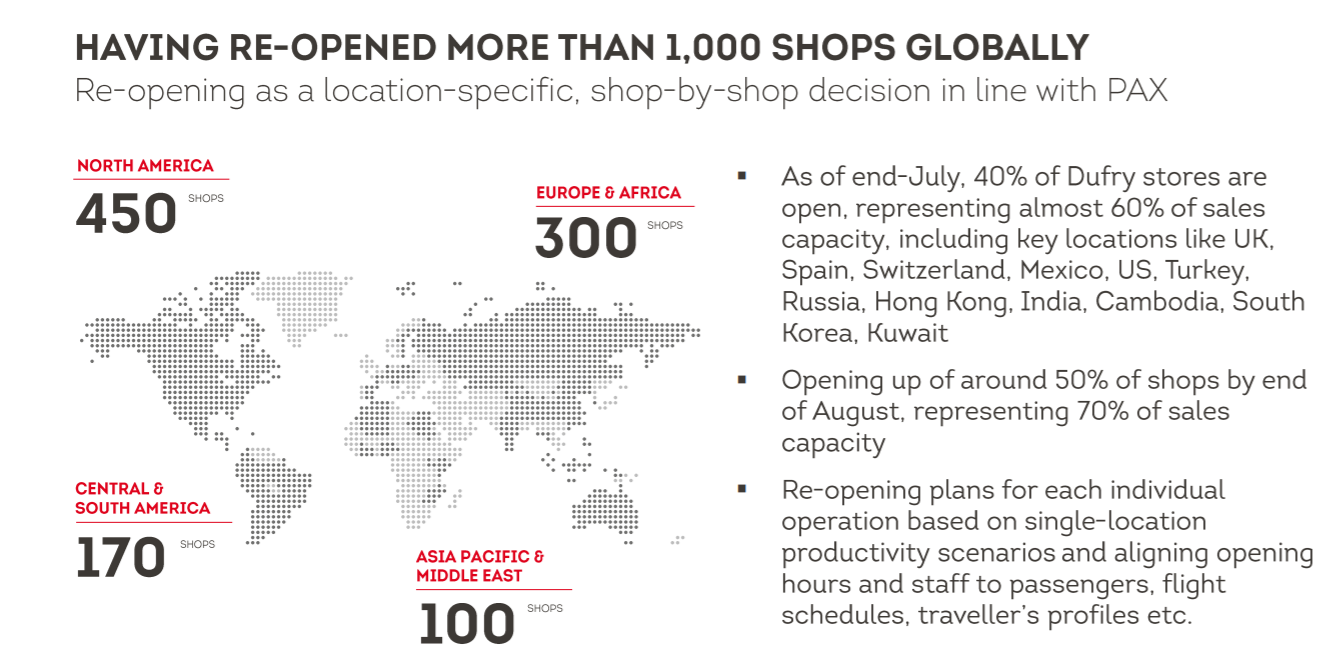INTERNATIONAL. Dufry Group said today that sales have partially recovered in the short period following the easing of travel restrictions in some markets, but added that there is a long way to go on the journey to recovery. CEO Julián Díaz’s comments followed news of the group’s half-year results, announced this morning, with turnover down by -62% year-on-year.
He said that sales in April were 4-5% of the comparable level in 2019, rising to around 9% in each of May and June. This increased to 20% of 2019 levels in July and as high as 40% in the first three days of August.
Díaz noted: “There is light at the end of the tunnel. We have seen recent per head spending rise by +20% above last year (mainly due to changes in passenger profile), which is encouraging though it is too early to extract conclusions.” Sales have progressed in line with the pick-up of domestic travel in Asia and the US, he noted, alongside an increasing number of intra-EU flights since mid-June.

Dufry also highlighted the key pillars on which it plans to build recovery. These include a crisis action plan already under way (improved liquidity, cost control, lower expenses, rental deals with landlords); reorganisation (from 1 September) and a productivity-driven reopening plan; plus resuming profitable growth through generation of synergies, cash generation, risk diversification and an increased geographical spread, with a focus on Asia, along with an enhanced digitalisation drive.

Commenting on negotiations with landlords, Dufry noted that it had struck agreements releasing partially or totally CHF161.8 million (US$176.8 million) of Minimum Annual Guarantee (MAG) obligations (to 30 June). Dufry has already received offers granting further MAG relief in relation to the first half of 2020 for CHF137 million (US$150 million), which will be recognised in its accounts once confirmed.

Asked by analysts how negotiations with landlords have advanced, Díaz said: “My feeling is optimistic about this. We are close to agreeing positive conclusions for around 70% of the MAGs that we have today.
“On concession fees, we have more than 1,000 contracts in place. If you are asking if we have agreed some reliefs of MAGs for 2021, then the answer is yes. Only part of these are subject to MAGs, and some of those are subject to a minimum per passenger. When you have a minimum per passenger then it is automatically adapted to the reality.
“We also have some where we have renegotiated the total to be paid in 2020, and others in the process of being documented that will consider the evolution of passengers in 2021. How much each contributes I cannot say now, but we have a significant number of contracts that have been renegotiated for 2021 and not just for 2020.”

He added later: “In general I can confirm that in most cases airports are very willing to support the companies. I think it is likely that in practice the MAGs or variable rents will be adapted to reality of business in next two years until the situation normalises.”
The company did not directly address payments to brand owners (as discussed in an interview with The Moodie Davitt Report recently), but said that it had a formula to protect gross margin and reduce net working capital (covering inventories, trade receivables and payables). Díaz said: “This is a supportive move and allows us to adapt the business to the reality at the time.”
Díaz said that Dufry had no plans to sell off stock through other channels. “Our inventory is good quality and we are not selling our valued inventory. Most of it will be sold through the shops that we aim to reopen very soon.”

Crucially he noted that liquidity of CHF1,583.7 million gave the company a more “secure” position financially. CFO Yves Gerster added: “We do not expect any liquidity problems during the crisis.”
Commenting on the likely sales mix in the new world of travel, the company repeated its view that in crisis, core categories such as P&C, confectionery & food, spirits and tobacco would show more resilience, with a greater negative impact likely in luxury.
Dufry is encouraging shoppers towards what it views as the most attractive categories for travellers in this early period. Díaz said: “We have used the information from a customer survey in June to learn some lessons, for example about what people will buy, such as food & beverage and spirits and other drinks. At locations such as Madrid, Barcelona or London Heathrow we have prepared layouts with [signage] on floors to encourage people to go to specific areas that house the products that we think will be most successful.”
Based on its online survey of 25,000 Dufry customers, the retailer said that 58% had a flight booked for 2020 and encouragingly, most intend to engage with the duty free shop and interact with staff.
As reported earlier, Dufry Group plans to reopen around 50% of its stores by the end of August, representing 70% of sales capacity.
By the end of July around 40% of stores were open, including those in UK, Spain, Switzerland, Mexico, US, Turkey, Russia, Hong Kong, India, Cambodia, South Korea and Kuwait.













